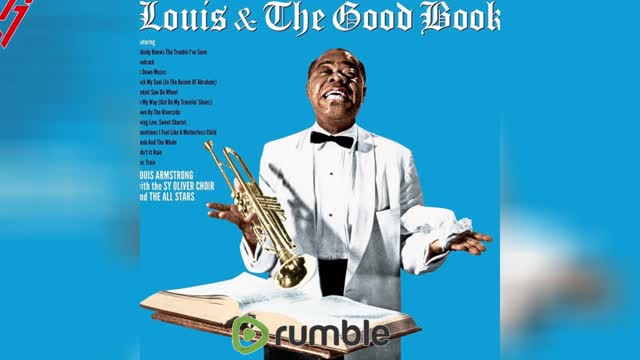Premium Only Content

Louis Armstrong
00:00 - Louis Armstrong
00:04 - 1 - Who Was Louis Armstrong?
Louis Armstrong, nicknamed "Satchmo," "Pops" and, later, "Ambassador Satch," was a native of New Orleans, Louisiana. An all-star virtuoso, he came to prominence in the 1920s, influencing countless musicians with both his daring trumpet style and unique vocals.
Armstrong's charismatic stage presence impressed not only the jazz world but all of popular music. He recorded several songs throughout his career, including he is known for songs like "Star Dust," "La Vie En Rose" and "What a Wonderful World."
Early Life
Louis Armstrong was born on August 4, 1901, in New Orleans, Louisiana, in a neighborhood so poor that it was nicknamed "The Battlefield."
Armstrong had a difficult childhood: His father was a factory worker and abandoned the family soon after Louis's birth. His mother, who often turned to prostitution, frequently left him with his maternal grandmother. Armstrong was obligated to leave school in the fifth grade to begin working.
A local Jewish family, the Karnofskys, gave young Armstrong a job collecting junk and delivering coal. They also encouraged him to sing and often invited him into their home for meals.
On New Year's Eve in 1912, Armstrong fired his stepfather's gun in the air during a New Year's Eve celebration and was arrested on the spot. He was then sent to the Colored Waif's Home for Boys.
There, he received musical instruction on the cornet and fell in love with music. In 1914, the home released him, and he immediately began dreaming of a life making music.
01:46 -2 - King Oliver:
While he still had to work odd jobs selling newspapers and hauling coal to the city's famed red-light district, Armstrong began earning a reputation as a fine blues player.
One of the greatest cornet players in town, Joe "King" Oliver, began acting as a mentor to the young Armstrong, showing him pointers on the horn and occasionally using him as a sub.
02:07 - 3 - First Spouse:
By the end of his teens, Armstrong had grown up fast. In 1918, he married Daisy Parker, a prostitute, commencing a stormy union marked by many arguments and acts of violence.
During this time, Armstrong adopted a three-year-old boy named Clarence. The boy's mother, Armstrong's cousin, had died in childbirth. Clarence, who had become mentally disabled from a head injury he had suffered at an early age, was taken care of by Armstrong his entire life.
Fate Marable
Meanwhile, Armstrong's reputation as a musician continued to grow: In 1918, he replaced Oliver in Kid Ory's band, then the most popular band in New Orleans.
He was soon able to stop working manual labor jobs and began concentrating full-time on his cornet, playing parties, dances, funeral marches and at local "honky-tonks"—a name for small bars that typically host musical acts.
Beginning in 1919, Armstrong spent his summers playing on riverboats with a band led by Fate Marable. It was on the riverboat that Armstrong honed his music reading skills and eventually had his first encounters with other jazz legends, including Bix Beiderbecke and Jack Teagarden.
03:24 - 4 - Big Band Jazz:
Though Armstrong was content to remain in New Orleans, in the summer of 1922, he received a call from Oliver to come to Chicago and join his Creole Jazz Band on second cornet.
Armstrong accepted, and he was soon taking Chicago by storm with both his remarkably fiery playing and the dazzling two-cornet breaks that he shared with Oliver. He made his first recordings with Oliver on April 5, 1923; that day, he earned his first recorded solo on "Chimes Blues."
Armstrong soon began dating the female pianist in the band, Lillian Hardin. After they married in 1924, Hardin made it clear that she felt Oliver was holding Armstrong back. She pushed her husband to cut ties with his mentor and join Fletcher Henderson's Orchestra, the top African American dance band in New York City at the time.
Armstrong joined Henderson in the fall of 1924 and immediately made his presence felt with a series of solos that introduced the concept of swing music to the band. Armstrong had a great influence on Henderson and his arranger, Don Redman, both of whom began integrating Armstrong's swinging vocabulary into their arrangements—transforming Henderson's band into what is generally regarded as the first jazz big band.
However, Armstrong's southern background didn't mesh well with the more urban, Northern mentality of Henderson's other musicians, who sometimes gave Armstrong a hard time over his wardrobe and the way he talked. Henderson also forbade Armstrong from singing, fearing that his rough way of vocalizing would be too coarse for the sophisticated audiences at the Roseland Ballroom.
Unhappy, Armstrong left Henderson in 1925 to return to Chicago, where he began playing with his wife's band at the Dreamland Café.
05:12 - 5 - Louis Armstrong and his Hot Five:
While in New York, Armstrong cut dozens of records as a sideman, creating inspirational jazz with other greats such as Sidney Bechet, and backing numerous blues singers including Bessie Smith.
Back in Chicago, OKeh Records decided to let Armstrong make his first records with a band under his own name: Louis Armstrong and his Hot Five. From 1925 to 1928, Armstrong made more than 60 records with the Hot Five and, later, the Hot Seven.
Today, these are generally regarded as the most important and influential recordings in jazz history; on these records, Armstrong's virtuoso brilliance helped transform jazz from an ensemble music to a soloist's art. His stop-time solos on numbers like "Cornet Chop Suey" and "Potato Head Blues" changed jazz history, featuring daring rhythmic choices, swinging phrasing and incredible high notes.
He also began singing on these recordings, popularizing wordless "scat singing" with his hugely popular vocal on 1926's "Heebie Jeebies."
The Hot Five and Hot Seven were strictly recording groups; Armstrong performed nightly during this period with Erskine Tate's orchestra at the Vendome Theater, often playing music for silent movies. While performing with Tate in 1926, Armstrong finally switched from the cornet to the trumpet.
Research: Vitor hugo Lizardi Leonardi
Hello friend, I am a big music lover and because I thought that without music I would be nothing in this life, I created this channel, the soul is the root of music, and in my humble view, everything we hear today of good music is related to the soul . If you liked it, leave your Like and subscribe to the channel of this force so that new content like this can be produced, thank you very much.
Come meet me, and give your opinion about the channel, for me it's very important!
Good reading ,The 7 Habits of Highly Effective People
https://www.amazon.com.br/Habits-Highly-Effective-People-Powerful/dp/1982137274/ref=asc_df_1982137274/?tag=googleshopp00-20&linkCode=df0&hvadid=379726347250&hvpos=&hvnetw=g&hvrand=6784634493429849819&hvpone=&hvptwo=&hvqmt=&hvdev=c&hvdvcmdl=&hvlocint=&hvlocphy=20104&hvtargid=pla-908915591470&psc=1
Music credit:
What A Wonderful World
Played: Louis Armstrong, Tommy Goodman
Composed: Gerorge David Weiss, George Douglas
Produced: Bob Thiele
Source: Geffen
#Louis Armstrong,#New Orleans,#stars,#trumpet and unique vocals,#charismatic presence,#jazz world,#popular music,#career,#Louisiana,#difficult childhood,#prostitute,#local Jewish family,#work collecting garbage ,#vitorleonardi,
-
 14:07
14:07
Mrgunsngear
1 day ago $46.62 earnedStreamlight MegaStream USB EDC Flashlight Review 🔦
160K18 -
 7:43:57
7:43:57
SpartakusLIVE
15 hours agoNEW MODE || Massive Resurgence || Friday Night HYPE
72.7K1 -
 2:03:18
2:03:18
TimcastIRL
13 hours agoBiden Special Counsel Audio LEAKS His Brain Was FRIED Democrats COVERED IT UP | Timcast IRL
679K165 -
 1:18:49
1:18:49
Man in America
17 hours agoEXPOSED: Big Pharma’s Sinister Takeover of the Cannabis Industry w/ Inesa Ponomariovaite
71.5K32 -
 1:26:25
1:26:25
FreshandFit
14 hours agoThe Current State Of The Manosphere w/ Rollo Tomassi
112K25 -
 2:50:39
2:50:39
I_Came_With_Fire_Podcast
22 hours agoCOMEY GOING TO JAIL | CHINESE KILL SWITCHES | BIRTHRIGHT CITIZENSHIP
56.1K16 -
 3:54:07
3:54:07
SynthTrax & DJ Cheezus Livestreams
1 day agoFriday Night Synthwave 80s 90s Electronica and more DJ MIX Livestream AI ART SHOWCASE Edition
87.6K10 -
 2:21:34
2:21:34
TheSaltyCracker
14 hours agoThreatening Trump is Bad Idea ReeEEEStream 05-16-25
174K283 -
 4:08:03
4:08:03
Saycred Angel Live
12 hours ago🍻FRIDAY FAMILY FIGHT NIGHT🍻!TANGIA | !GIVEAWA
67.8K4 -
 4:40:01
4:40:01
Alex Zedra
12 hours agoLIVE! Come hang
69.9K11